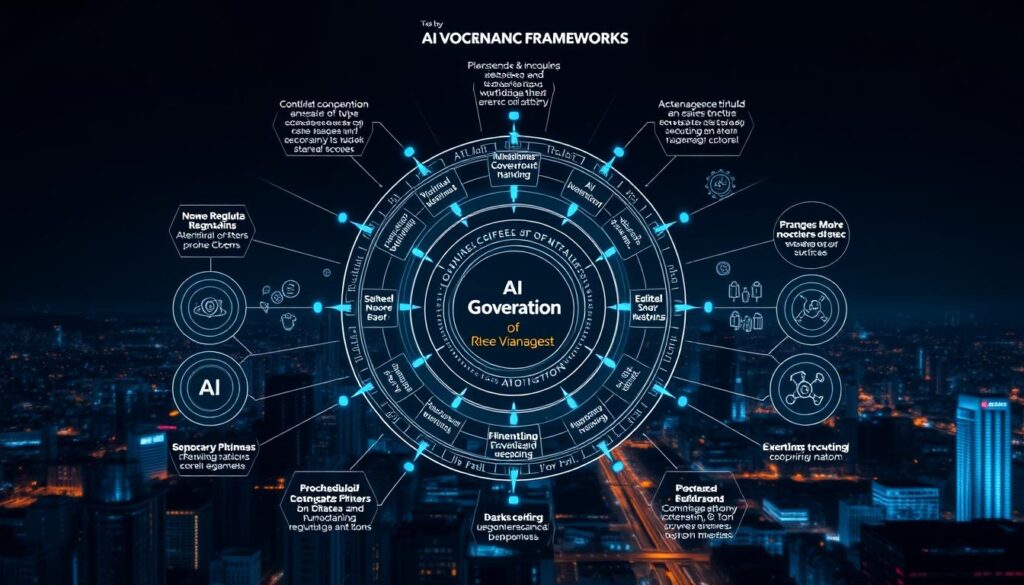Did you know that over 60% of global companies are already deploying AI systems? Yet, only a small fraction has established comprehensive ethical guidelines for their use. This stark reality highlights the pressing need to grasp AI ethics and its importance in our rapidly evolving technological world.
The socio-economic impact of AI is vast, touching sectors from healthcare to employment. Ethical considerations are paramount in shaping how these technologies influence society. At the core of responsible AI practices is a fine balance between innovation and moral values. This ensures AI development benefits humanity as a whole. In this article, we explore the fundamental aspects of AI ethics, shedding light on its significance and effective implementation.
Key Takeaways
- AI ethics is essential for balancing innovation with moral values.
- Responsible AI practices ensure technologies benefit society.
- Comprehensive ethical guidelines are lacking in many organizations deploying AI.
- The socio-economic impact of AI spans multiple sectors, including healthcare and employment.
- Understanding AI ethics is crucial for the future of technological development.
Understanding AI Ethics: A Definition
In the rapidly evolving realm of artificial intelligence, establishing a comprehensive understanding of AI ethics is paramount. AI ethics encompasses a set of artificial intelligence principles which guide the design, development, and deployment of AI systems. These principles ensure that AI systems align with societal values and norms.
What Constitutes AI Ethics?
AI ethics is constructed on the foundation of key components such as transparency, fairness, and accountability. These components are crucial for fostering trust and reliability in AI technologies. Ethical AI development requires adhering to these principles. This ensures the mitigation of biases, the explanation of AI decisions, and the integrity of AI decision-making processes.
The Importance of Ethical Guidelines
Creating ethical guidelines is vital in steering the responsible development of AI systems. They serve as essential benchmarks that help developers and organizations navigate the complexities of AI technologies. By adhering to AI governance frameworks, stakeholders can ensure that AI implementations responsibly address issues such as bias, privacy, and security. This aligns artificial intelligence with ethical and legal standards.
Key Principles of AI Ethics
The principles of AI ethics are essential for building trust in artificial intelligence systems. They ensure AI technologies benefit society and minimize harm. Fairness, transparency, and accountability are the core principles of responsible AI practices.
Fairness and Bias Mitigation
Fairness in AI requires strategies to prevent and correct biases in automated systems. It is crucial to mitigate algorithmic bias to avoid perpetuating societal inequalities. AI systems must provide equitable outcomes for diverse communities, emphasizing the need for fair treatment.
Transparency and Explainability
Transparency is a cornerstone of AI ethics. AI transparency and accountability are key for users to understand decision-making processes. Explainability allows AI systems to clarify their decision-making. This transparency is vital for public trust and scrutiny, leading to more responsible AI practices. For a deeper understanding, explore this AI ethics resource.
Accountability in AI Systems
Maintaining accountability in AI systems ensures entities responsible for their development can be held accountable. Establishing clear lines of responsibility and governance mechanisms is critical. By adopting these principles, organizations demonstrate their commitment to ethical standards, building more trustworthy AI applications.
The Role of AI in Society
The integration of Artificial Intelligence (AI) into society is transforming various sectors, challenging traditional frameworks. Understanding the socio-economic impact of AI is crucial. It’s essential to explore its role in employment, decision-making, and healthcare.
Impact on Employment
AI’s introduction into the employment landscape is significant. Automation and machine learning streamline processes, but job displacement concerns grow. The socio-economic impact of AI presents a dual narrative—increasing efficiency and necessitating skill diversification. Sustaining human-AI collaboration is vital for fostering new job opportunities and promoting workforce adaptability.
Influence on Decision-Making
The influence of AI on decision-making processes is evident in industries like finance and logistics. Ethical AI development is crucial, as algorithms make decisions affecting people’s lives. Effective human-AI collaboration ensures AI-driven decisions are balanced, transparent, and fair. This addresses ethical dilemmas in automated environments.
Ethical Implications in Healthcare
In healthcare, AI’s integration promises advancements in diagnostics, treatment plans, and patient care. Ethical considerations must be paramount to ensure data privacy, unbiased algorithms, and equitable access. The ethical AI development in healthcare relies on a balanced approach. This approach enhances medical outcomes while respecting patient rights and moral standards.
Challenges in Implementing AI Ethics

The journey towards ethical AI systems is beset with numerous hurdles. Technical constraints hinder the consistent application of ethical principles. Regulatory challenges and public skepticism also impede the adoption of ethical AI frameworks.
Technical Limitations
Despite significant progress in AI, technical barriers persist. Current frameworks often struggle to manage the complexity of ethical considerations. Ensuring data privacy and security remains a formidable challenge for developers and companies.
Regulatory Hurdles
AI regulations are still evolving. Policymakers face the daunting task of crafting laws that address AI’s ethical, privacy, and security aspects. The creation of universal frameworks is essential but is complicated by diverse regional and national laws.
Public Perception and Trust Issues
Building trust in AI is another critical challenge. Historical misuse and data breaches have fostered widespread skepticism. Companies must emphasize transparency and uphold data privacy and security to regain public trust in AI.
Ethical Frameworks for AI Development
In the realm of artificial intelligence, establishing robust ethical AI development frameworks is paramount. Various renowned organizations and institutions have proposed principles that promote responsible AI practices. These frameworks are designed to ensure that AI operations are conducted in a manner that respects human rights, promotes fairness, and mitigates potential biases.
Principles from Organizations and Institutions
Institutions like the IEEE and the European Commission have been pioneers in creating AI governance frameworks. Their principles often focus on transparency, accountability, and the ethical use of AI. For instance, the European Commission’s guidelines stress the need for AI systems to be fair, non-discriminatory, and explainable. These guidelines are essential for fostering public trust and acceptance of AI technologies.
Aligning Business Objectives with Ethos
For businesses, integrating these principles into their operations is crucial for achieving sustainable and responsible AI practices. Aligning business objectives with the ethos of ethical AI development not only enhances corporate reputation but also ensures long-term compliance with regulatory standards. By adopting these frameworks, businesses can proactively address potential ethical challenges and contribute positively to the societal impact of AI technologies.
Case Studies in AI Ethics
Real-world instances of AI’s successful and problematic implementations offer crucial lessons. They underscore the significance of ethical AI development. We explore cases that highlight the need for AI transparency and accountability. These cases also stress the importance of addressing algorithmic bias mitigation.
Successful Ethical AI Implementations
IBM and Google lead in ethical AI development. IBM’s Watson Health exemplifies *AI transparency and accountability*. It makes its data and algorithms open for auditing. This openness ensures that healthcare decisions by AI are understandable and justifiable.
Google has also made significant strides in *algorithmic bias mitigation*. By regularly updating and testing their AI systems against diverse datasets, Google aims to reduce biases. This effort underscores the importance of fairness and accuracy in AI technologies.
Learning from Ethical Failures
On the other hand, AI failures have severe consequences when ethics are neglected. The COMPAS case, a criminal risk assessment tool, faced criticism for biased predictions against minority groups. The lack of *AI transparency and accountability* in its development led to significant social and legal repercussions.
Facebook’s algorithmic challenges also underscore the need for *algorithmic bias mitigation*. Instances where the platform’s AI system promoted divisive content showed how unchecked algorithms can worsen societal issues. These failures highlight the ongoing need for vigilant oversight and ethical guidelines in AI practices.
These case studies collectively affirm that prioritizing ethical AI development is crucial. They show that AI transparency and accountability, along with proactive algorithmic bias mitigation, are key. These elements are essential for fostering positive AI-driven outcomes.
The Future of AI Ethics
The future of AI ethics is a dynamic field, constantly evolving with technological advancements and emerging challenges. As AI technology advances, the need for ethical considerations intensifies. This section explores anticipated trends in AI regulation and the emerging ethical concerns that will shape AI’s future.
Trends in AI Regulation
With AI applications expanding, there is a pressing need for comprehensive AI regulation trends to uphold ethical standards. Regulatory frameworks are anticipated to evolve, addressing data privacy, algorithmic transparency, and accountability. The European Union’s AI Act is a pioneering effort, setting a global precedent. Expect more countries and regions to develop similar regulations, aiming to harmonize and enforce AI ethics globally.
Emerging Ethical Concerns in Technology
The rapid advancement of AI technologies raises several emerging ethical concerns that demand careful consideration. These include the ethical implications of autonomous systems, bias in machine learning algorithms, and the societal impact on employment and privacy. Companies and developers must remain vigilant, addressing these concerns to foster public trust and the responsible use of AI.
By grasping these emerging ethical concerns and staying abreast of AI regulation trends, you can navigate the complexities of AI ethics. This will enable you to contribute to a future where technology benefits humanity.
Getting Involved in AI Ethics Conversations

As AI technology progresses, engaging in AI ethics discussions becomes more vital. This involvement ensures AI systems adhere to ethical standards and societal values. Here are practical ways to participate:
Join Professional Organizations
Membership in professional AI ethics organizations provides significant opportunities for contribution. Groups like the AI Ethics Lab, IEEE Global Initiative on Ethics of Autonomous and Intelligent Systems, and the Partnership on AI offer platforms for leadership, collaboration, and policy-making. By engaging with these entities, you can stay abreast of advancements and influence the ethical AI landscape.
Participate in Public Discourse
Engaging in public AI ethics discussions is also crucial. Contributing to forums, social media, and public debates widens the AI ethics dialogue. By expressing concerns, sharing knowledge, and proposing solutions, you can shape public opinion and policy. Active participation in conferences and webinars further enhances your influence in these critical discussions.
Conclusion: Embracing AI Ethics
As we conclude our exploration into AI ethics, it’s crucial to recognize the significance of embracing AI ethics across all facets of artificial intelligence development and application. The rapid evolution of AI technologies demands an equally swift progression in creating and adhering to ethical frameworks.
The Importance of Ongoing Education
An essential component to this commitment is the necessity for ongoing AI ethics education. Continuous learning and adaptation are paramount, ensuring that individuals and organizations stay informed about the latest ethical considerations. Resources such as articles, workshops, and professional courses can provide valuable insights to both practitioners and policymakers. For more information on the importance of AI ethics, visit IMD’s blog on AI ethics.
Call to Action for Stakeholders
All stakeholders, from developers to regulatory bodies, have a role to play in the ethical deployment of AI. This call to action for AI stakeholders emphasizes the importance of collaboration and dialogue. By collectively committing to these principles, we can foster an ecosystem that prioritizes fairness, transparency, and accountability.
Integrating ethical considerations into AI systems isn’t just a regulatory requirement; it’s a moral imperative. Together, by embracing AI ethics and committing to ongoing education, we can ensure a more equitable and just technological future.

